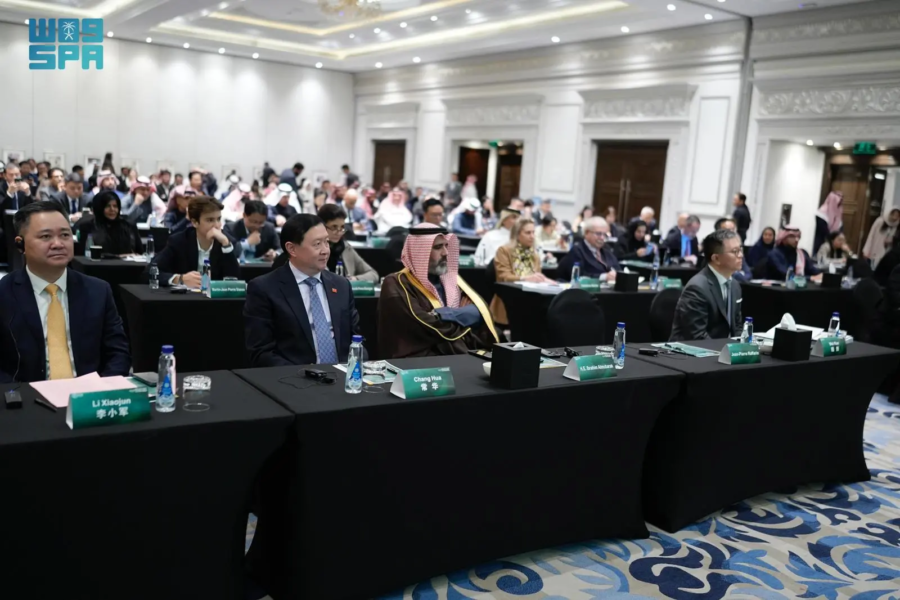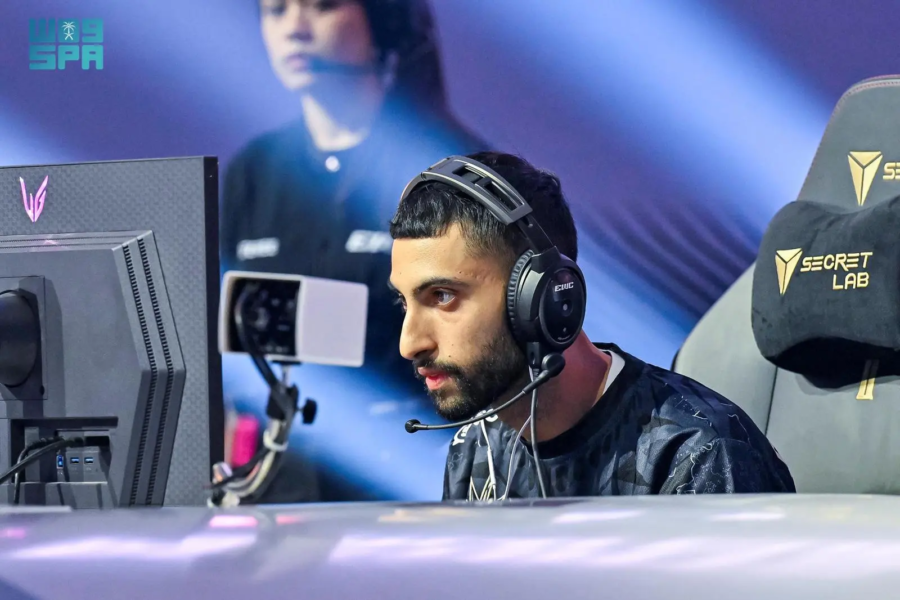
|
|||
QUOTED
|
|||
TOP STORYAramco CEO takes aim at current energy transition strategies
“There is more chance of Elvis speaking next than the current plan working,” stated Saudi Aramco President and CEO Eng. Amin H. Nasser in his keynote speech at CERAWeek 2025 in Houston, Texas. [more] |
|||
TOP STORYMiddle East (and KSA) top recipient of China’s BRI investment in 2024
The Middle East was the top recipient of construction and investment deals under China’s Belt and Road Initiative (BRI) in 2024, with the total value reaching $39 billion. Almost half, $19 billion, was invested in Saudi Arabia. [more] |
|||
TOP STORYSaudi Arabia celebrates Flag Day
Saudi Flag Day is March 11 commemorating when late King Abdulaziz bin Abdulrahman Al Saud approved the Saudi flag on 27 Dhul-Hijjah 1355 AH (March 11, 1937). [more] |
|||
TOP STORYSaudi adds to gaming portfolio with Pokémon Go
Scopely Inc., which was purchased by Saudi Arabia’s Public Investment Fund’s subsidiary Savvy Games in 2023, has agreed to acquire the gaming division of developer Niantic which includes Pokémon Go and Monster Hunter for $3.5 billion. [more] |
|||
TOP STORYIslamic Arts Biennale in Jeddah
The second Islamic Arts Biennale entitled And All That Is In Between (Wama Bainahuma) is being held in Jeddah at King Abdulaziz International Airport’s Western Hajj Terminal from January 25 to May 15. [more] |
|||
Oil, dollars, and debt: How safe is the Middle East from the global trade war?Via Natasha Turak in cnbc.com: Direct impact from tariffs, like the U.S. levies on steel and aluminum imports, have just a minimal impact on the Middle East, economists say. The Gulf region, for instance, accounted for roughly 16% of U.S. aluminum imports in 2024, led by the United Arab Emirates and Bahrain, Standard Chartered MENA Economist Carla Slim told CNBC. While those sectors may be affected, analysts say, the hit will be minor. But the blow to growth from a trade war is likely to hurt the price of oil, the mainstay of the region’s economy. There are also immediate costs to countries whose currencies are pegged to the dollar, such as Saudi Arabia, the UAE, Qatar, Oman, and Bahrain. The U.S. dollar has been selling off since the start of the year, making imports for countries with dollar pegs more expensive – a challenge for a region highly dependent on goods from abroad. |
|||
Saudi Aramco, IEA Chiefs Clash In Houston Over The Future Of OilVia Alex Kimani in oilprice.com: With the CERAWeek 2025 conference in Houston drawing to a close, C-Suite executives, ministers and top officials have weighed in on the trajectory of the global oil and gas sector with experts debating whether tariffs, trade, and competition will replace security, affordability, and sustainability in shaping energy markets and policy. However, one of the biggest highlights of the conference has been the showdown between Saudi Aramco’s CEO Amin Nasser and IEA Executive Director Fatih Birol and their highly divergent views on the future of the global oil industry. Once again, the Aramco CEO was adamant that there were “inherent flaws” in the energy transition away from conventional fuels, saying, “So I pay little attention to forecasts claiming that next year will be peak this, or peak that,” in a thinly-veiled dig at the IEA which has predicted a peak in oil demand by the end of the current decade. |
|||
Saudi Arabia still needs consultants despite PwC banVia Edmund Bower in agbi.com: “They can’t do this without a lot of people and a lot of expertise,” said Dane Albertelli, a senior analyst at Source Global Research, which analyses global consultancies. “At the moment, they’re kind of maxed out.” Neither PIF, the $925 billion sovereign wealth fund at the forefront of the kingdom’s investment drive, nor PwC have commented publicly but it seems that a fight over expertise was the most immediate cause of the spat. The UK’s Financial Times has reported that PIF was irked by an attempt by PwC to poach a top auditor from one of its subsidiaries, Neom. These giga projects and others need specialised skills that are in relative short supply in the kingdom of 19 million Saudi citizens, almost half of whom are under the age of 30. Mohammad Al Qahtani, a former senior official in the Saudi royal household, and now CEO of Riyadh-based investment management company Saudi Arabia Holding Co, told his 308,000 followers on LinkedIn last week: “The PIF-PwC decision isn’t just a headline – it’s a wake-up call.” |
|||
Navigating volatility: The impact on GCC economiesVia James Drummond in agbi.com: The optimism is welcome – but it may be misplaced. This week the Riyad Bank Purchasing Managers’ Index in Saudi Arabia hit its highest level in more than 10 years – a significant vote of confidence in the Arab world’s largest economy. There was positive news too on jobs in the kingdom. Employment rose “solidly” last year, the survey found. Elsewhere, the local advisory house Jadwa Investment reported that consumer spending in Saudi Arabia rose by 7.5 percent last year – implying that ordinary people are happy to spend rather than save for the unforeseen. Government revenue and spending were also higher than budgeted, Jadwa said, using finance ministry figures. So far, so good. |
|||
Saudi Arabia’s Deficit to Widen as Aramco Dividend Normalisesin fitchratings.com: Aramco announced on 4 March that the performance-related dividend in 1Q25 would be reduced to USD200 million, from USD10.8 billion in 1Q24, while the base dividend rose by 4.2% to USD21.1 billion. It anticipates a total dividend payment of USD85.4 billion over 2025, equivalent to around 7.7% of Fitch-forecast GDP. Around 82% of this should flow directly to the government budget, in line with its equity stake, with a further 16% going to the Public Investment Fund (PIF). We believe this is generally aligned with Fitch’s existing view that total dividend payments will average around USD82 billion a year over 2025-2028. Aramco’s announcement is broadly consistent with our projection in January that the budget deficit would widen to 3.8% of GDP in 2025 and 3.9% in 2026. This forecast assumed oil prices of USD70/barrel (bbl) in 2025 and USD65/bbl in 2026, and that Aramco’s performance dividend would be substantially reduced, reflecting more limited excess cash flow available for distribution from 2024. Fitch also expects the government to cut capex and associated current spending in 2025. |
|||
Saudi Investment Fund pays $3.5bn to capture Pokémon GoVia Tom Gerken in bbc.com: Saudi Arabia’s Public Investment Fund (PIF) will pay $3.5bn (£2.7bn) to buy the gaming division of developer Niantic, whose titles include the hit mobile game Pokémon Go. The game involves players walking around in the real world to hunt the collectable creatures, which appear on their phone screens using augmented reality. Despite launching almost a decade ago, Pokémon Go is still amongst the highest-grossing mobile games in the world, with 30 million monthly players. The deal marks the latest step by Saudi Arabia to develop its gaming industry, which it has spent billions of pounds on in recent years. Niantics other games, such as Monster Hunter Now and Pikmin Bloom, are also included in the acquisition, along with the people employed to make them. They will become part of Scopely Inc – which itself was bought by PIF subsidiary Savvy Games Group for $4.9bn in 2023. Scopely is one of the biggest names in mobile gaming, with its most successful title, Monopoly Go, being downloaded more than 50 million times and generating more than $3bn in revenue. |
|||
The changing face of project finance around the GulfVia Matt Smith in agbi.com: Project finance is a funding model often used for infrastructure, in which repayment comes from revenue generated by the completed facility rather than being guaranteed by the owners. “Repayment depends on the project succeeding,” says Rahul Bajaj, director of Mena equity research at Citi in Dubai. As such, banks expect a premium for accepting the higher risk. “These are usually not low-margin products,” adds Bajaj. The project finance model is expected to play a bigger role in supporting the Gulf’s economic development. As governments push ahead with mega-projects, especially in Saudi Arabia and the UAE, the need for alternative financing mechanisms has grown, bankers say. |
|||
US resumes sending aid, intel to Ukraine; seeks ‘yes’ from Russia on ceasefireVia Patrick Tucker in defenseone.com: Ukrainian President Volodymyr Zelenskyy said in his own statement that the day’s discussions began with Ukraine’s key priorities: stopping Russia’s missile and drone attacks, releasing prisoners of war, the return of Ukrainian children taken to Russia, and building confidence in the overall diplomatic process. “The American side understands our arguments and considers our proposals,” Zelenskyy said. “The U.S. side proposed taking an even bigger first step—a 30-day full interim ceasefire, not only stopping missile, drone, and bomb attacks, not only in the Black Sea, but also along the entire front line. Ukraine is ready to accept this proposal.” |
|||
Saudi Arabia rebrands as mediator for global crisesVia Jennifer Holleis and Majda Bouazza in dw.com: Saudi Arabia’s Crown Prince Mohammed bin Salman is increasingly busy hosting state leaders who fly in to discuss pressing global conflicts. This Monday, Ukrainian President Volodymyr Zelenskyy met the Saudi Crown Prince to speak about Russias war in Ukraine. This is ahead of a Tuesday meeting between Ukrainian and a US teams set to negotiate a potential end to Russias war of aggression, as well as a security deal that would include US access to Ukraines valuable mineral and metal deposits. It will be the first time that Ukrainian and US delegates talk face-to-face after the public spat between US President Donald Trump and President Zelenskyy in the White House in late February. The fact that the two countries have agreed to meet in Saudi Arabia — and not, say, in Europe — highlights the emerging key position of the oil-rich kingdom in the Middle East. Saudi Arabia has indeed established itself as a platform for dialog in the last two to three years, Sebastian Sons, a senior researcher for the German think tank CARPO, told DW. In Saudi Arabias foreign policy strategy, it currently plays a very important role to talk to everyone, he added. |
|||
US wants Ukraine to do difficult things, Rubio says ahead of Saudi ceasefire talksVia David Brennan in go.com: The two sides have framed Tuesdays talks as a way to reset bilateral relations following last months explosive Oval Office meeting between Trump, Zelenskyy and Vice President JD Vance. The showdown prompted Trump to denounce Kyiv as the main impediment to peace in Ukraine, as well as placing a freeze on U.S. military aid and some intelligence sharing. The most important thing that we have to leave here with is a strong sense that Ukraine is prepared to do difficult things, Secretary of State Marco Rubio — who will lead the U.S. delegation — said on Monday ahead of the talks. Zelenskyy has stressed his readiness for peace, though repeatedly warned that any agreement must ensure deterrence against future Russian aggression. On Monday, Zelenskyy — who will not take part in Tuesdays talks — traveled to Saudi Arabia to meet with crown prince and de facto ruler Mohammed bin Salman. |
|||
The Politics of Water Insecurity in the Middle EastVia Natasha Hall in csis.org: The Middle East is no stranger to water scarcity and violence. For centuries, conflict has exacerbated water insecurity and vice versa. But the region is now at a tipping point. Groundwater aquifers are running dry or becoming contaminated, populations are exploding, and borders are more hardened than ever, making resettlement—a time-tested survival strategy—impossible. As is the case across much of the region, water security fell prey to the lack of political progress on resolving underlying conflicts. Without that political progress, donor governments and aid agencies have resorted to applying technical fixes to political problems. But in the Palestinian territories, as in much of the world, water insecurity has been a sign of deeper dysfunction. |
|||
Analysis: Why Saudi Arabia Makes Sense For Ukraine Peace TalksVia Nathan Hodge: The talks are slated to bring together a Ukrainian delegation that will include Ukrainian Foreign Minister Andriy Sybiha, Zelenskyys chief of staff Andriy Yermak, and Defense Minister Rustem Umerov. US Secretary of State Marco Rubio is also due in Jeddah; in addition to meetings with Ukrainian counterparts, the State Department said he is also expected to meet with the Saudi crown prince. Saudi Arabia’s role in potential peace talks came into focus in February, when US and Russian diplomatic officials held a first round of talks on ending the war in Ukraine. Those discussions yielded the promise of slightly less frigid relations between Washington and Moscow, with the two countries agreeing to begin restoring diplomatic ties. But the ruckus in the Oval Office showed, dealmaking with Trump is a highly personal affair. And the Saudi crown prince, widely known by his initials MBS, has a uniquely close relationship with the US president. |
|||
More Saudi women take the lead with over 78,000 in senior roles, 551,000 business ownersin saudigazette.com: In honor of International Women’s Day, Saudi Arabia’s General Authority for Statistics released data highlighting the increasing role of Saudi women in the workforce, leadership positions, and entrepreneurship. According to the report, Saudi Arabia is home to 9.8 million women, with 36.2% participating in the labor force as of the third quarter of 2024. The employment-to-population ratio for Saudi women reached 31.3%, reflecting steady progress in workforce inclusion. The report also shows that more Saudi women are stepping into leadership and business roles. In 2024, 78,356 Saudi women held senior management positions, while 551,318 women registered businesses in 2023. Freelancing is also on the rise, with 449,725 Saudi women obtaining freelance work permits in 2023. Meanwhile, the tourism industry saw a boost in female employment, with 111,259 Saudi women working in tourism-related jobs in 2024. |
|||
Aramco slashes blue ammonia output to reduce costsVia Eva Levesque in agbi.com: Saudi Aramco has scaled down its low carbon ammonia production target by 80 percent because of high costs and low demand. The company has adjusted its production objective from 11 million tonnes per annum (mpta) by 2030 to 2.5 mpta, it has said. The new target is still subject to the availability of commercially viable long-term offtake projects, Amin Nasser, Aramco CEO, told analysts during an earnings call this week. “We refined the target. The market is not evolving quickly enough considering the high cost,” Nasser said. Nasser said Aramco, which is the world’s largest oil company by value, is in discussions with potential ammonia buyers but will only go ahead with production if it secures agreements with “appropriate” returns. |
|||
Rubio heads to Saudi Arabia for US-Ukraine talks, then Canada for G7Via Nike Ching in voanews.com: U.S. Secretary of State Marco Rubio will arrive in Jeddah, Saudi Arabia, on Monday for U.S.-Ukraine talks as President Donald Trump pushes to broker a swift end to the Russia-Ukraine war, despite Russia’s latest massive aerial attacks against Ukraine’s energy infrastructure. While in Jeddah, Rubio will also meet with Saudi Crown Prince Mohammed bin Salman Al Saud to discuss ways to advance shared interests in the region and strengthen the U.S.-Saudi relationship, said State Department spokesperson Tammy Bruce. According to the State Department, Rubio has “underscored President Trumps determination to end the war as soon as possible and emphasized that all sides must take steps to secure a sustainable peace” in a Friday call with Ukrainian Foreign Minister Andrii Sybiha. |
|||